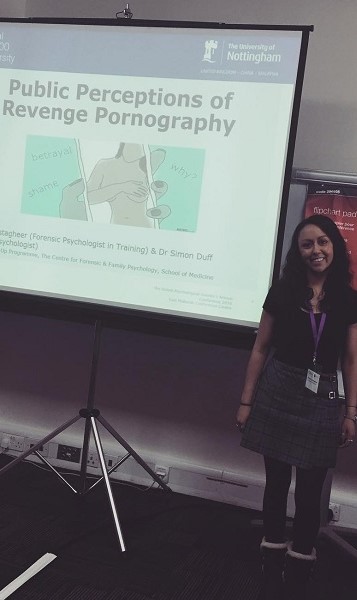
May 17, 2018, by Kate
Conference presentation with the BPS for Elspeth Dustagheer (DForenPsy trainee)
Elspeth Dustagheer discusses her experiences of presenting her research on public perceptions of revenge pornography at the BPS annual conference
As part of the Forensic Psychology Doctorate at The University of Nottingham (DForenPsy), Forensic Psychologists in Training are required to present their research at a national conference. Having previously produced an interactive poster of my research (in its infancy) for a Research Forum in the previous year, I placed a submission to deliver an oral presentation of it at the British Psychological Society’s Annual Conference 2018. To my surprise (with elements of dread), I was accepted.
The BPS’ Annual Conference offers a platform for academics, researchers and practitioners from all divisions of psychology to share and learn about current research. There were several reasons why I chose to place a submission to present at this conference (aside from presenting being a requirement). I hoped to:
- demonstrate some of the work being undertaken within the field of forensic psychology, particularly to those who may not be familiar with this division
- obtain insight from professionals from a range of psychology divisions regarding the topic and my findings
- develop my skills in succinct communication (because being succinct is something I am continuously having to work on – having to cut out 8000 words from a recent assignment is a good example of this…)
- challenge my anxiety surrounding public speaking
Despite this being an incredibly daunting task, the experience was invaluable and my hopes were met. Not only did it generate interesting discussions, it gave me the opportunity to consider/interpret my findings from different perspectives that I had not previously thought of (aided by the fact that audience members were from a range of psychology divisions) and think of ways that I could improve my work. Additionally, it enabled me to establish some useful connections and network with those who shared an interest in the topic.
Undertaking a doctorate is hard work and in my experience, there have been moments where I have questioned my competence (and have subsequently felt defeated). The days preceding the conference were no exception (if anything, these thoughts and feelings were heightened). But the encouragement, support and interest I received from conference delegates was staggering (and was something that I was not expecting). This response, combined with the encouragement I received from doctorate staff, has reminded me that “I can do this” and for that, I am grateful. Whilst I can’t say that my anxiety surrounding public speaking has disappeared, it has reduced somewhat. I certainly haven’t been put off delivering oral presentations at conferences/events in the future.
To all Forensic Psychology Doctorate students (current and in-the-making) – whilst it is a requirement of the course that you present your research at a conference, try and view it as more than a simple obligation. It enables the development of research ideas and communication skills, offers a chance to network with professionals, provides an opportunity to challenge yourself, and is great preparation for your viva!
Elspeth is supervised by Dr Simon Duff, Deputy Director of Forensic Programmes, Faculty of Medicine & Health Sciences, University of Nottingham.
No comments yet, fill out a comment to be the first

Leave a Reply